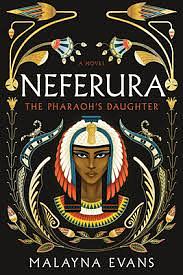Take a photo of a barcode or cover
medium-paced
Plot or Character Driven:
Character
Strong character development:
No
Loveable characters:
No
Diverse cast of characters:
Yes
Flaws of characters a main focus:
Yes
adventurous
challenging
dark
emotional
hopeful
mysterious
reflective
medium-paced
Plot or Character Driven:
A mix
Strong character development:
Yes
Loveable characters:
Yes
Diverse cast of characters:
Yes
Flaws of characters a main focus:
Yes
adventurous
emotional
medium-paced
Plot or Character Driven:
A mix
Strong character development:
Yes
Loveable characters:
Yes
Diverse cast of characters:
Yes
Flaws of characters a main focus:
No
As a historical fiction fanatic, when I saw there was an historical fiction set in Ancient Egypt I was immediately intrigued. I have read countless retellings of Ancient Greek lore recently and yet none set in Egypt. I had never heard of Neferura and found her journey navigating her friendships, strength and autonomy incredibly interesting. As a reader, you feel incredibly immersed in the Egyptian culture of the time; the overwhelming lack of female autonomy and agency makes you empathize and feel angry on behalf of our protagonist.
I enjoyed watching Neferura really come into to her own by the end of the story amidst her mother (who's a pharaoh) and her brother (who's also a pharaoh) destructive battle for the throne. I have not hated an antagonist like her brother in a very long time. Truly, I hated him to my core.
Unfortunately I found the ending quite rushed (everything seems to happen in the last 15%). Furthermore, while I was hoping for more lyrical prose and writing style, I would say the writing feels very direct, literal, and YA-esque.
Thank you to NetGalley for this eARC. All opinions are my own.
I enjoyed watching Neferura really come into to her own by the end of the story amidst her mother (who's a pharaoh) and her brother (who's also a pharaoh) destructive battle for the throne. I have not hated an antagonist like her brother in a very long time. Truly, I hated him to my core.
Unfortunately I found the ending quite rushed (everything seems to happen in the last 15%). Furthermore, while I was hoping for more lyrical prose and writing style, I would say the writing feels very direct, literal, and YA-esque.
Thank you to NetGalley for this eARC. All opinions are my own.
emotional
informative
mysterious
tense
medium-paced
This book reminds me a lot of Madeline Miller’s Circe. I like the storytelling from different perspectives than what we’ve read about in history books. Especially from the perspectives of strong women. The writing was well done and I found myself able to flow with the story.
I felt certain aspects of the plot were a little questionable and I could have used a little more context or explanation. However, I really enjoyed Neferura’s character development over the course of the book. It’s always refreshing to see a woman answering the call of her power within.
The plot unraveled rather slowly at first, but when it started heating up, I was hooked until the end.
Thank you to NetGalley and Sourcebooks Landmark for giving me the opportunity to review this ARC.
I felt certain aspects of the plot were a little questionable and I could have used a little more context or explanation. However, I really enjoyed Neferura’s character development over the course of the book. It’s always refreshing to see a woman answering the call of her power within.
The plot unraveled rather slowly at first, but when it started heating up, I was hooked until the end.
Thank you to NetGalley and Sourcebooks Landmark for giving me the opportunity to review this ARC.
I’ll start by saying that the narration of this audiobook is not enjoyable. It’s very robotic and the voices for different characters are slightly annoying… That being said, the book itself was captivating. I enjoy Greek mythology novels and this felt similar.
emotional
tense
medium-paced
Plot or Character Driven:
A mix
Strong character development:
Yes
Loveable characters:
Yes
Diverse cast of characters:
Yes
Graphic: Death, Incest
Neferura by Malayna Evans is a historical fiction novel that tells the story of the daughter of the famous Egyptian pharaoh Hatshepsut, who faces danger and betrayal from her half-brother Thutmose. The novel is based on extensive research and historical accuracy, and it portrays the culture and politics of ancient Egypt in a vivid and engaging way. Evans is an Egyptologist and her passion and knowledge are evident. The novel also celebrates the power and friendship of women, as Neferura forms alliances with a mysterious tattooed wise woman and other female characters who help her navigate the complex court intrigues.
However, the novel also suffers from some flaws that may disappoint some readers. The pacing of the novel is uneven, with a slow and dragging first half that does not capture the reader’s attention or curiosity. After starting and reading the first third, it took me two months to pick it up again to finish. The writing style is almost too juvenile to capture the teen and adult audience (which many YA books are able to do quite successfully) and it fails to convey the depth and emotion of the characters and the plot. The characterization of Neferura, and others, is weak and inconsistent, and they often act in ways that are not consistent. The novel also lacks a satisfying climax and resolution, and it leaves many questions unanswered.
Overall, it is a novel that has a lot of potential. It may appeal to readers who are interested in ancient Egypt and female empowerment, but it may also frustrate readers who are looking for a more mature and compelling historical fiction. It also has no "fantasy" elements despite being tagged by the publisher with that element.
However, the novel also suffers from some flaws that may disappoint some readers. The pacing of the novel is uneven, with a slow and dragging first half that does not capture the reader’s attention or curiosity. After starting and reading the first third, it took me two months to pick it up again to finish. The writing style is almost too juvenile to capture the teen and adult audience (which many YA books are able to do quite successfully) and it fails to convey the depth and emotion of the characters and the plot. The characterization of Neferura, and others, is weak and inconsistent, and they often act in ways that are not consistent. The novel also lacks a satisfying climax and resolution, and it leaves many questions unanswered.
Overall, it is a novel that has a lot of potential. It may appeal to readers who are interested in ancient Egypt and female empowerment, but it may also frustrate readers who are looking for a more mature and compelling historical fiction. It also has no "fantasy" elements despite being tagged by the publisher with that element.
Overall, this was an enjoyable read. I very much loved the themes of strong female friendships and relationships, of empowering one's self in difficult situations, and of the struggle to keep from being consumed by power and all its temptations. However, problems with the pacing, plot, and the writing kept me from liking it more than I would have otherwise.
I admit I very much loved the contrast of Hatshepsut and Hathor, two very powerful women (albeit in different ways). Both wield their power with the skill and ease of longstanding practitioners, and yet only one of them is utterly consumed by their power to the exclusion of all else. Only one loses everything, bit by bit, because of their constant pursuit of power. The other, on the other hand, does what she can with her power, but accepts that some things are simply out of her hands. And in the end, one dies after suffering the loss of everything they've built, while the other is set to live in peace, knowing that their work will continue on.
I also loved the friendships between Neferura and the many women around her, from Iset to Satiah and Nebtah and the other priestesses. It was lovely to that these women were so bound up in their shared goals and affections for one another, and that we did not see a betrayal from within.
My issues with the pacing start with the first part of the book. While I understand that the first part is to establish the characters, particularly Neferura, so that we can see where they start and what they'll begin to grow into, but oh wow, it was *slow* going. I was so bored watching Neferura bumble around, though it's not surprising. She's in such a cutthroat world, and she's clearly been sheltered, so it makes sense that she'd mess up quite a bit early on. The second and third parts of the book were much better pacing-wise. The plot drives things much more, and the intrigue and plotting that abound was absolutely delightful to follow.
However, there were still some problems with the plot. As others have pointed out on here, things wrap up quite easily. Thutmose gets his heir, unaware that the boy is actually a child of a priestess and an unknown father (which I'm sure would enrage him if he did know), a wife he's convinced himself he's in love with, unaware that she thinks he's a complete fool, and the country he views as his birthright. Neferura cuts ties with a life she despises, taking her child to run off with her lover and become the new Chief Spymistress over all of Egypt. While Neferura has learned a lot by the end of the book, I'm thinking that Hathor will definitely have a lot still to teach her before she's ready to stand on her own. But it all just wrapped up so fast! I think I'd have liked to have seen more of how everything was put into place - getting Neferura and her baby out of the palace without anyone noticing, the placement of the boy in the royal nursery in Neferura's child's place, etc - instead of having it told to me in the epilogue.
Also, I could definitely have done without the romance between Neferura and her guard. It felt so forced, and it really brought the story down in a lot of ways. This book is billed as an adult book, but the romance and a lot of the other elements really made it feel like it was written for older teens. Even the lack of going into explicit details (which I was actually grateful for on a personal level) makes it feel more like a teen book.
Still, problems aside, Neferura was a very enjoyable read. 3.5 stars
I admit I very much loved the contrast of Hatshepsut and Hathor, two very powerful women (albeit in different ways). Both wield their power with the skill and ease of longstanding practitioners, and yet only one of them is utterly consumed by their power to the exclusion of all else. Only one loses everything, bit by bit, because of their constant pursuit of power. The other, on the other hand, does what she can with her power, but accepts that some things are simply out of her hands. And in the end, one dies after suffering the loss of everything they've built, while the other is set to live in peace, knowing that their work will continue on.
I also loved the friendships between Neferura and the many women around her, from Iset to Satiah and Nebtah and the other priestesses. It was lovely to that these women were so bound up in their shared goals and affections for one another, and that we did not see a betrayal from within.
My issues with the pacing start with the first part of the book. While I understand that the first part is to establish the characters, particularly Neferura, so that we can see where they start and what they'll begin to grow into, but oh wow, it was *slow* going. I was so bored watching Neferura bumble around, though it's not surprising. She's in such a cutthroat world, and she's clearly been sheltered, so it makes sense that she'd mess up quite a bit early on. The second and third parts of the book were much better pacing-wise. The plot drives things much more, and the intrigue and plotting that abound was absolutely delightful to follow.
However, there were still some problems with the plot. As others have pointed out on here, things wrap up quite easily. Thutmose gets his heir, unaware that the boy is actually a child of a priestess and an unknown father (which I'm sure would enrage him if he did know), a wife he's convinced himself he's in love with, unaware that she thinks he's a complete fool, and the country he views as his birthright. Neferura cuts ties with a life she despises, taking her child to run off with her lover and become the new Chief Spymistress over all of Egypt. While Neferura has learned a lot by the end of the book, I'm thinking that Hathor will definitely have a lot still to teach her before she's ready to stand on her own. But it all just wrapped up so fast! I think I'd have liked to have seen more of how everything was put into place - getting Neferura and her baby out of the palace without anyone noticing, the placement of the boy in the royal nursery in Neferura's child's place, etc - instead of having it told to me in the epilogue.
Also, I could definitely have done without the romance between Neferura and her guard. It felt so forced, and it really brought the story down in a lot of ways. This book is billed as an adult book, but the romance and a lot of the other elements really made it feel like it was written for older teens. Even the lack of going into explicit details (which I was actually grateful for on a personal level) makes it feel more like a teen book.
Still, problems aside, Neferura was a very enjoyable read. 3.5 stars




